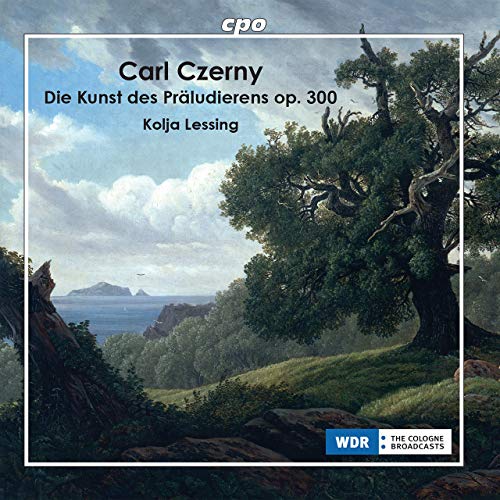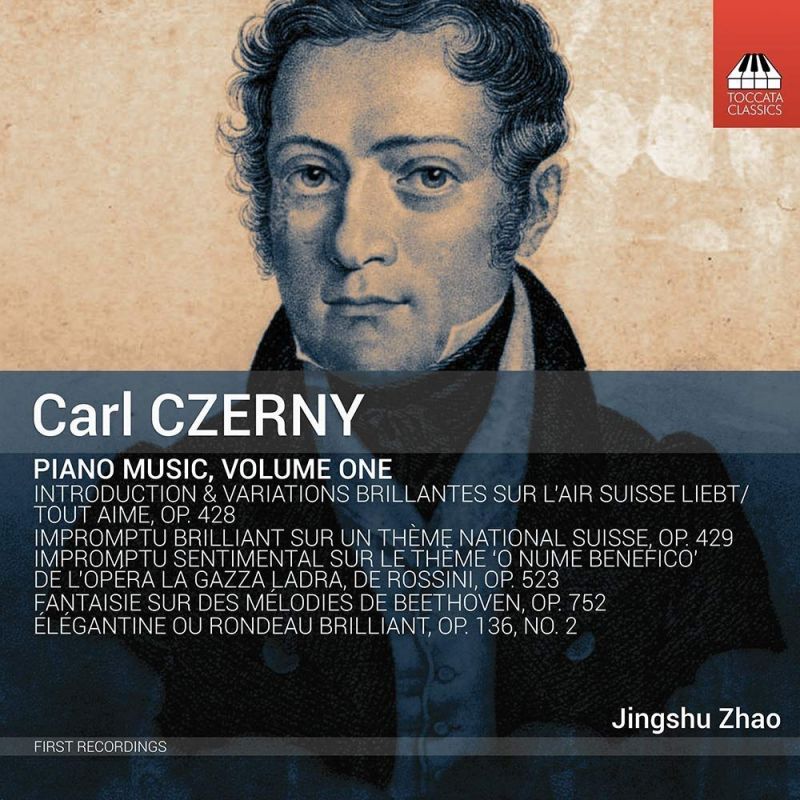CZERNY Piano Works (Zhao. Lessing)
View record and artist detailsRecord and Artist Details
Composer or Director: Carl Czerny
Genre:
Instrumental
Label: CPO
Magazine Review Date: 10/2019
Media Format: CD or Download
Media Runtime: 115
Mastering:
DDD
Catalogue Number: CPO555 169-2

Tracks:
| Composition | Artist Credit |
|---|---|
| Die Kunst des Präludierens | Carl Czerny, Composer Carl Czerny, Composer Kolja Lessing, Piano |
Composer or Director: Carl Czerny
Genre:
Instrumental
Label: Toccata Classics
Magazine Review Date: 10/2019
Media Format: CD or Download
Media Runtime: 66
Mastering:
DDD
Catalogue Number: TOCC0020

Tracks:
| Composition | Artist Credit |
|---|---|
| Introduction & Variations brillantes sur l’air suisse Alles liebt / Tout aime | Carl Czerny, Composer Carl Czerny, Composer Jingshu Zhao, Piano |
| Impromptu brillant sur un thème national suisse | Carl Czerny, Composer Carl Czerny, Composer Jingshu Zhao, Piano |
| Impromptu sentimental sur le thème ‘O nume benefico' de l’opéra La gazza ladra, de Rossini | Carl Czerny, Composer Carl Czerny, Composer Jingshu Zhao, Piano |
| Élégantine ou Rondeau brillant | Carl Czerny, Composer Carl Czerny, Composer Jingshu Zhao, Piano |
| Fantaisie sur des mélodies de Beethoven | Carl Czerny, Composer Carl Czerny, Composer Jingshu Zhao, Piano |
Author: Patrick Rucker
In 1833 Diabelli published Carl Czerny’s Op 300, a collection of appropriate examples of the practice, as The Art of Preluding, advertised as ‘Part Two’ of A Systematic Introduction to Improvisation on the Pianoforte, Op 200. Kolja Lessing, the Karlsruhe-born violinist and pianist who now teaches in Stuttgart, has recorded Czerny’s preludes in a two-disc set for CPO. Lessing’s unfailingly musical performances reveal the breadth of musical culture, both historical and contemporary, that Czerny brought to these miniatures, a few of which could be small stand-alone compositions.
Also impressive is their stylistic variety. One finds, for instance, mini-overtures appropriate to Bach, others that might introduce a work of Mozart, as well as those that might preface a sonata by Clementi or Beethoven. Well crafted as they are, these preludes also serve as examples of what might be improvised, rather than as cut-and-dried addenda ready for attachment to a piece in performance. That said, this is 116 minutes of music which, as a compelling listening experience, will probably correlate directly to one’s interest in historical performance practice.
It may seem odd that a compendium of 121 essentially functional examplars, 89 of which are less than a minute in length, is more stylish and satisfyingly expressive than a group of fully developed, finished pieces meant for concert use, but such is the case. At issue here is neither Czerny’s compositional skill nor the intrinsic value of the music, but of the performances on the second of these two releases. Jingshu Zhao’s readings of Czerny’s variations, impromptus, fantasies and rondos suggest not so much that she is temperamentally unsuited to the aesthetics of early 19th-century opera and popular tunes as reflected in piano music of the period but that she is ignorant of them. No one would argue that she is not equal to the sometimes significant technical challenges Czerny poses. On the other hand, one listens in vain for some differentiation between the lyrical and the dramatic, the profound and the trivial or, indeed, any decisive characterisation at all. Musical events file past in imperturbable equanimity, strangers to joy or sadness, bland and colourless. If it’s living, breathing Czerny you’re after, Martin Jones’s sonata series on Nimbus or the piano trios by Shin, Hayek and Gingher on Naxos are probably better bets.
Explore the world’s largest classical music catalogue on Apple Music Classical.
Included with an Apple Music subscription. Download now.

Gramophone Digital Club
- Digital Edition
- Digital Archive
- Reviews Database
- Events & Offers
From £9.20 / month
Subscribe
Gramophone Club
- Print Edition
- Digital Edition
- Digital Archive
- Reviews Database
- Events & Offers
From £11.45 / month
Subscribe
If you are a library, university or other organisation that would be interested in an institutional subscription to Gramophone please click here for further information.






